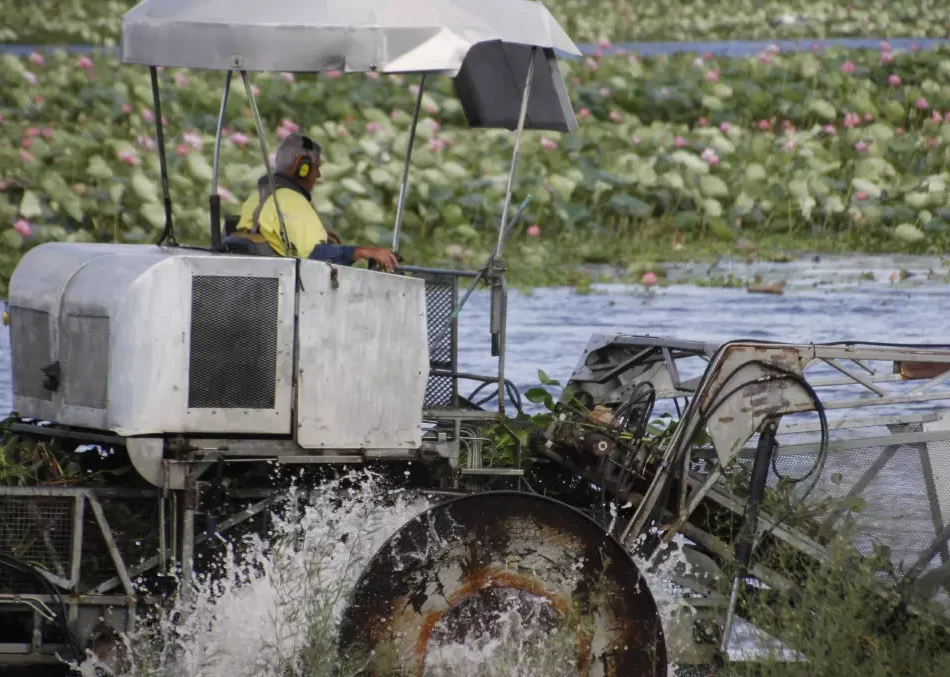A pilot project is underway in the Fitzroy River waterways to explore whether hyacinth, an invasive and fast spreading weed, could be turned into mulch or compost for agricultural use.
Around 500 tonnes of the weed will be removed from Murray Lagoon near Rockhampton and turned into mulch or compost.
It will be tested for its effectiveness at improving soil nutrition and microbe activity at three properties in the region, including a cropping, fruit and grazing operation.
The hyacinth will be converted into mulch and compost for the first trial, and potentially biochar and stockfeed in the future. The project is being managed by the Fitzroy Basin Association.


Images L-R: Hyacinth being harvested at Murray Lagoon near Rockhampton. Pictures supplied by the Fitzroy Basin Association. The mulch and compost products will be trailed at a cropping, fruit and grazing operation in the Rockhampton region.
FBA waterway management coordinator Braden Micthell said hyacinth was highly reproductive and could double in volume within a week, forming large mats and choking waterways.
“It causes damage by obstructing navigation, blocking and damaging irrigation infrastructure, impeding drainage, destroying wildlife habitat and food, and restricting outdoor recreation.
He said it was also disrupting the habitat of the critically endangered white-throated snapping turtle and endangered Fitzroy River turtle.
“In the pilot, we’re working with three land managers who will test how well the hyacinth mulch works on their properties,” Mr Mitchell said.
“The properties include cropping, fruit and grazing properties so we hope to get a good idea of how the fertiliser product works across a range of operations.
“If the compost is deemed beneficial, it’s hoped to become a permanent product for the region’s land managers,” he said.
FBA adoption manager Daniel Boshoff said the project was about creating a product that could be used within a circular economy model.
“Hyacinth is fairly simple to remove from watercourses, but once it’s removed a large volume of waste is generated that needs to be managed,” he said.
“By turning this waste into a commercial product while reducing hyacinth infestation and impacts on the river and wildlife is a major win for the water quality and our communities.
“We want to use a waste product and make something useful so it replaces fertiliser and mulch that land managers usually have to pay for.”
RRC mayor Tony Williams said the project was an important initiative for the region.
“We know that hyacinth can be a real problem for our waterways, but through this project we are trailing an innovative way of turning the weed into a viable fertiliser product for our local farmers and primary producers.
“Reuse, recycling and resource recovery is an important principle for our environment and agriculture sectors and present a real opportunity to deliver cost effective and efficient solutions.
Anthony Curro, chief executive CRCNA said the program was unlocking opportunities across the north through next generation agriculture.
“We’re building more resilient and circular economies that create real world outcomes for a more sustainable development future,” he said.
“The Making Water Work program is a great example of taking the invasive hyacinth weed and recycling its biomass to create positive environmental outcomes by aiding agricultural growth, improving the physical condition of the soil and achieving improved water quality outcomes for the Great Barrier Reef.”
Regional director (central) of rural economic development, Department of Agriculture and Fisheries, Fleur Anderson said the project was an innovative approach to dealing with an invasive weed.
“It will also help realise circular economic opportunities in central Queensland by re-purposing hyacinth into a fertiliser and a livestock product.
“This pilot will help maximise the local economic contribution of the new Rookwood Weir irrigation precinct.”
The pilot project results were expected by the end of 2024, with James Cook University responsible for testing its effectiveness.
The Hyacinth Recovery and Reuse Pilot project is part of the Rockhampton Regional Council’s Making Water Work Program and is managed by the FBA.
The project is funded by the Queensland Department of Agriculture and Fisheries, and supported by the Cooperative Research Centre for Developing Northern Australia and Rockhampton Regional Council.

Image: Advance Rockhampton’s Wade Clark, Rockhampton Regional Council mayor Tony Williams and FBA waterway management coordinator Braden Mitchell.
Queensland Country Life 21 March 2024 – https://www.queenslandcountrylife.com.au/story/8562477/testing-hyacinth-weed-as-mulch-or-compost-for-primary-producers/


